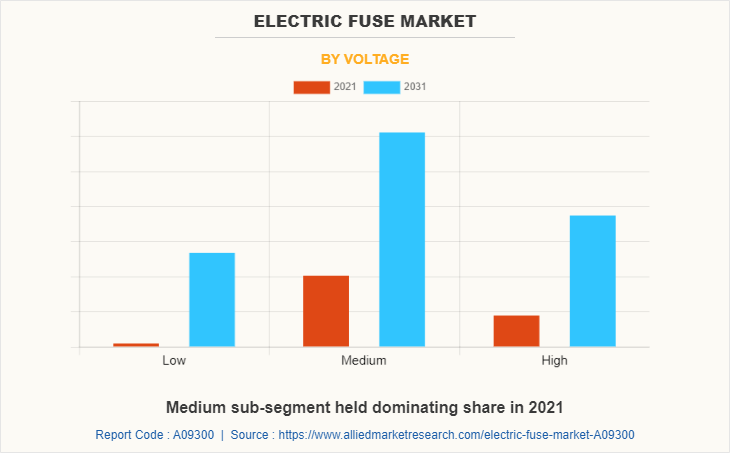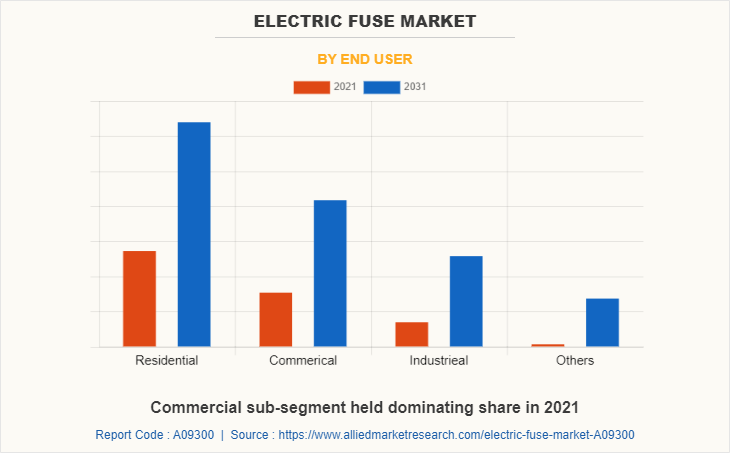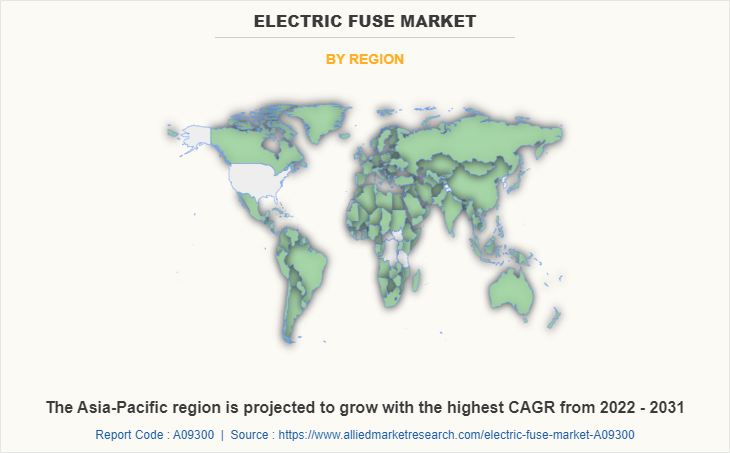Electric Fuse Market Research, 2031
The global electric fuse market size was valued at $4.5 billion in 2021 and is projected to reach $9.3 billion by 2031, growing at a CAGR of 7.7% from 2022 to 2031. An electrical fuse is a type of safety device that protects electrical equipment against current overflow in an electrical circuit. A metal wire or strip that melts when an overcurrent flows through it is an important component of an electrical fuse.
Mechanical drives, boilers, furnaces, heating, ventilation, air-conditioning (HVAC) systems, and other similar devices consume a lot of fuel and electricity. Traditional energy sources include, among others, those used by IC engines, furnaces, and boilers powered by fossil fuels. Industries are increasingly opting for electric options in products and operations to transition to a low-carbon future and ensure reliable operations. This trend is more pronounced in developed countries where national governments are actively pursuing carbon-neutral goals. By electrifying, businesses can achieve their sustainability goals while lowering their energy and overhead costs.

Electric fuses have long been an important component of end-user circuit protection equipment. However, in the low-voltage market, there has been a significant shift away from the use of electric fuse boxes toward miniature circuit breakers (MCBs) and molded case circuit breakers (MCCBs), as these circuit protection devices are more dependable, safe, reusable, sensitive, have a better interface, and do not require manual intervention. MCBs, MCCBs, protective relays, and increased investments in smart grid vision are likely to limit the electric fuse market growth.
Industry players are investing a lot of effort in the research and development of smart and unique strategies to sustain their growth in the electric fuse market opportunity. These strategies include product launches, mergers & acquisitions, collaborations, partnerships, and refurbishing of existing technology. In January 2019, Mersen announced the release of the class RK1 reducer fuses product line. The newly developed product is ideal for manufacturing facilities and differs from other fuses in terms of reliability, durability, and flash mitigation. Through such developments, the company is determined to broaden its product portfolio. Additionally, in May 2018, Mersen announced the signing of an agreement to acquire FTCap, which will allow the company to expand its product portfolio from high-speed fuses, cooling devices, and laminated bus bars to capacitors. Merson’s position in the global power electronic market will be strengthened as a result of this.
The key players profiled in this electric fuse market forecast report include ABB Ltd., Siemens AG, Schneider Electric SE, Fuji Electric Co., Ltd, Eaton Corporation Plc, Littelfuse, Inc., Mersen S.A., Bel Fuse Inc., SCHURTER AG, and Conquer Electronics Co., Ltd.
Segment Overview
The global electric fuse market outlook is segmented based on voltage, end-user industry, and region. By voltage, the electric fuse market is sub-segmented into low, medium, and high. By end-user industry, the market is classified into residential, commercial, industrial, and others. By region, the market is analyzed across North America, Europe, Asia-Pacific, and LAMEA.
The electric fuse market is segmented into Voltage and End User.
By voltage, the low sub-segment is anticipated to show the fastest growth by 2031. The low voltage segment is expected to grow rapidly due to its wide range of applications, primarily in electronics and automobiles. The device's penetration will be boosted by its ability to reliably protect electrical installations and signal circuits from overload and short circuit currents. Low-voltage fuse use has several benefits, including safety and protection from short circuits Easy assembly, installation, and disassembly are additional benefits of low-voltage fuse boxes, all of which can contribute to the electric fuse market.

By end-use industry, the residential sub-segment dominated the global electric fuse market share in 2021. The constantly expanding construction market, which includes both commercial and residential structures, is likely to fuel the electric fuses market demand. An electrical fuse is a type of safety device that protects electrical equipment. Modern infrastructures involve a plethora of electrical equipment, such as linked appliances, attractive lighting, air-conditioning facilities, security appliances, and so on. These developments are likely to boost the electric fuse market growth in the segment.

By region, Asia-Pacific dominated the global market in 2021 and is projected to remain the fastest-growing sub-segment during the forecast period. Asia-Pacific is expected to hold the largest market share due to rising per capita power consumption, which will be caused by increased urbanization and industrialization, demand from the construction industry, and demand for better electric and electronic equipment. Furthermore, the region's developing countries' strong manufacturing base and increased investments in infrastructure and power generation are likely to boost the market for electric fuses.

Key Benefits For Stakeholders
- This report provides a quantitative analysis of the market segments, current trends, estimations, and dynamics of the electric fuse market from 2021 to 2031 to identify the prevailing electric fuse market opportunities.
- The market research is offered along with information related to key drivers, restraints, and opportunities.
- Porter's five forces analysis highlights the potency of buyers and suppliers to enable stakeholders to make profit-oriented business decisions and strengthen their supplier-buyer network.
- An in-depth analysis of the electric fuse market segmentation assists in determining the prevailing market opportunities.
- Major countries in each region are mapped according to their revenue contribution to the global market.
- Market player positioning facilitates benchmarking and provides a clear understanding of the present position of the market players.
- The report includes an analysis of the regional as well as global electric fuse market trends, key players, market segments, application areas, and market growth strategies.
Electric Fuse Market Report Highlights
| Aspects | Details |
| Market Size By 2031 | USD 9.3 billion |
| Growth Rate | CAGR of 7.7% |
| Forecast period | 2021 - 2031 |
| Report Pages | 290 |
| By Voltage |
|
| By End User |
|
| By Region |
|
| Key Market Players | Siemens AG, ABB Ltd., Mersen S.A, Conquer Electronics Co., Ltd. , Bel Fuse Inc. , Fuji Electric Co., Ltd., SCHURTER AG, Schneider Electric SE, Littelfuse, Inc., Eaton Corporation Plc |
Analyst Review
The electrical fuse market is expanding rapidly, which can be ascribed to increased investments in renewable energy storage, increased spending in T&D infrastructure plans, and a resurrection of investments in the construction sector. Electric fuses are in high demand from electrical utilities due to their short life cycle and low replicability cost. According to the EIA, in the United States, investments in circuit protection equipment have increased by more than 60% over the last decade, generating opportunity for utilities to deploy electric fuses. Elevated demand for automobile electronics in the automobile industry, as well as investment renewal in the construction industry, are supporting the use of electric fuses. The prevalence of alternatives such as miniature circuit breakers (MCBs) and molded case circuit breakers (MCCBs) is expected to impede market growth.
Increased regulatory awareness towards facilitating emission reduction in automobiles, as well as the rapid emergence of electric and hybrid vehicles, are expected to drive market growth. Growing sophistication, capability, and convergence of electronic devices, as well as increasing consumer desire for connectivity and digital sources across the automotive industry, are expected to create opportunities for electric fuse market because electrical fuse is a type of safety device that protects electronic devices.
Among the analyzed regions, Europe is expected to account for the highest revenue in the market by the end of 2031, followed by Asia-Pacific, North America, and LAMEA. Rising electricity demand, an increasing population, and a shift in government focus towards reducing overload conditions to ensure uninterrupted power supply are driving the region's market growth.
The primary factors enabling industry growth are increased electricity demand and consistent power delivery. The demand for power and electricity has increased dramatically as a result of rapid economic growth and technological advancements, which are estimated to generate excellent opportunities in the global electric fuse market.
The major growth strategies adopted by electric fuse market players are investment and agreement.
Asia-Pacific will provide more business opportunities for the global electric fuse market in future.
ABB Ltd., Siemens AG, Schneider Electric SE, Fuji Electric Co., Ltd, Eaton Corporation Plc, Littelfuse, Inc., Mersen S.A, Bel Fuse Inc., SCHURTER AG, and Conquer Electronics Co., Ltd. are the major players in the electric fuse market.
Residential and commercial sub-segment of the end-use industry acquired the maximum share of the global electric fuse market in 2021.
Loading Table Of Content...
Loading Research Methodology...



